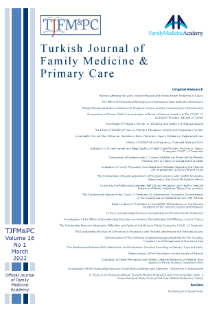Üçüncü Trimesterde Primipar Gebelerin Öz Yeterlilik Algısı ve Uyku Kalitesi Arasındaki İlişki
Gebelik, öz yeterlilik, uyku kalitesi
The Relatıonshıp Between Prımıpary Pregnancy Perceptıon of Self-Effıcıency and Sleep Qualıty in The Thırd Trımester
Pregnancy, self-efficacy, sleep quality,
___
- 1. Zhianian A, Zareban I, Ansari-Moghaddam A, Rahimi F. Improving self-care behaviours in pregnant women in zahedan: applying self-efficacy theory. CJHR 2015;1(1):18-26.
- 2. Wang PV, Lin PH, Lin CY, Yang SY, Chen KL. Does ınterpersonal ınteraction really ımprove emotion, sleep quality, and self-efficacy among junior college students? Int J of. Environ Res Public Health 2020;17 (12):2-15.
- 3. Jaqin N, Syafar M, Hatta M, Nontj W, Chalid M. Increasing of pregnancy education on the self efficacy of pregnant women in groups accompanied by their husbands and groups unaccompanied husband in gowa regency. International Journal of Sciences: Basic and Applied Research (IJSBAR) 2019; 44: 33-42. 4. Vasanthi RM, Manju Bala Dash, Felicia Chitra A. Is prenatal self-efficacy enhancing educational programme effective in ımproving maternal self efficacy during ıntrapartum period? JOJ Pub Health 2019; 5(3):66-70.
- 5. Smyka M, Kosi ´nska-Kaczy ´nska K, Sochacki-Wójcicka N, Zgliczy ´nska M, Wielgo´s M. Sleep problems in pregnancy—a cross-sectional study in over 7000 pregnant women in Poland. Int J Environ Res Public Health 2020; 17(15):5306.
- 6. National Sleep Foundation. Summary of Findings of the 2007 Sleep in America Poll. 2007.
- 7. Palagini L, Gemignani A, Banti S, Manconi M, Mauri M, Riemann D. Chronic sleep loss during pregnancy as a determinant of stress: impact on pregnancy outcome. Sleep Med 2014; 15; 853–859.
- 8. Parry BL, Martinez F, Maurer E, Lopez A, Sorenson D, Meliska C. Sleep rhythms and womens mood: part 1. menstrual cycle, pregnancy and postpartum. Sleep Med Rev 2006; 10:129–44.
- 9. Schlarb AA, Kulessa D, Gulewitsch MD. Sleep characteristics, sleep problems, and associations of self-efficacy among German university students. Nat Sci Sleep 2012; 4 ;1–7.
- 10. Sönmez A, Aksoy Derya Y. Effects of sleep hygiene training given to pregnant women with restless leg syndrome on their sleep quality. Sleep Breath 2018; 22(2): 527.
- 11. Ağargün MY, Kara H, Anlar Ö. Pittsburgh uyku kalitesi indeksi’nin geçerliği ve güvenirliği. Türk Psikiyatri Dergisi 1996; 7 (2). https://doi.org/10.1016/j.archger.2007.10.011 12. Buysse DJ, Reynolds CF, Monk TH, Berman SR, Kupfer DJ, Buysse DJ, et al. The pittsburgh sleep quality ındex: a new instrument for psychiatric practice and research. Psychiatry Res 1989; 28:193–213.
- 13. Aypay, A. The adaptation study of general self-efficacy (GSE) scale to Turkish. Inonu University Journal of the Faculty of Education 2011; 11(2):113–131.
- 14. Muz G, Eğlence R. Hemodiyaliz uygulanan hastalarda öz bakım gücü ve öz yeterliliğin değerlendirilmesi. Balıkesir Sağlık Bilimleri Dergisi 2012; 2(1): 15-21. 15. Ölçer Z, Bakır N, Oskay Ü. Yüksek riskli gebelerin öz yeterlilik ve sosyal destek algıları. Anadolu Hemşirelik ve Sağlık Bilimleri Dergisi 2016; 19(1):25-33. 16. Effati-Daryani F, Mohammad-Alizadeh-Charandabi S, Mohammadi A, Zarei S, Mirghafourvand M. Evaluation of sleep quality and ıts socio-demographic predictors in three trimesters of pregnancy among women referring to health centers in Tabriz, İran: a crosssectional study. Evidence Based Care Journal 2019; 9 (1): 69-76. 17. Taskiran N. Pregnancy and sleep quality. J Turk Soc Obstet Gynecol 2011; 8(3): 181- 7. 18. Karagozoglu S, Bingöl N. Sleep quality and job satisfaction of Turkish nurses. Nursing Outlook 2008; 56(6):298-307. 19. Mirghaforvand M, Mohammad-Alizadeh-Charandabi S, Zarei S, Effati-Daryani F, Sarand FS. The relationship between depression and sleep quality in Iranian pregnant women. International Journal of Women's Health and Reproduction Sciences 2017; 5(2):147-52. 20. Polo-Kantola P, Aukia L, Karlsson H, Karlsson, Paavonen EJ. Sleep quality during pregnancy: associations with depressive and anxiety symptoms. AOGS 2016; 96(2): 198–206.
- 21. Hutchison BL, Stone PR, McCowan LME, Stewart AW, Thompson JMD, Mitchell E. A postal survey of maternal sleep in late pregnancy. BMC Pregnancy Childbirth 2012; 12:144. 22. Mindell JA, Cook RA, Nikolovski J. Sleep patterns and sleep disturbances across pregnancy. Sleep Med 2015; 16(4), 483–488.
- 23. Przepiórka A, Błachnio A, Yat-Fan Siu N. The relationships between self-efficacy, self-control, chronotype, procrastination and sleep problems in young adults. Chronobıol Int 2019; 36(8): 1025-1035.
- ISSN: 1307-2048
- Yayın Aralığı: Yılda 4 Sayı
- Başlangıç: 2007
- Yayıncı: -
Çocukların Dijital Teknoloji Kullanımı ve Ebeveyn Yaklaşımları: Kesitsel Bir Çalışma
İdrar yolu enfeksiyonu ile tuvalet tipi arasında ilişki var mı?
Basri Furkan DAĞCIOĞLU, Erhan ŞİMŞEK, Ramazan İlbey TEPELİ
Sünnet Kanamasının Kontrolünde Hafif-Orta Baskılı Coban Bandaj Sargısının Etkinliği
Kubilay SARIKAYA, Çağrı ŞENOCAK, Muhammed Arif İBİŞ, Mehmet ÇİFTÇİ, Fahri Erkan SADİOĞLU, Ömer Faruk BOZKURT
Aile Hekimleri Sağlıklarına Ne Kadar Dikkat Ediyor? : Kesitsel Bir Çalışma
Murat ÇEVİK, Raziye Şule GÜMÜŞTAKIM, Celal KUŞ, Pınar BİLGİLİ
ÜRİNER İNKONTİNANSIN HUZUREVİ VE EVİNDE YAŞAYAN YAŞLILARDA YAŞAM KALİTESİNE ETKİSİ
Tugba DURDU, Serdar Selçuk KÖKSAL, Hakan YAVUZER, Nurver TURFANER SİPAHİOĞLU
Merve BİLGE, Ayşe AVCI, Mustafa KALE
Primipar adölesan annelerin bebeğini algılaması yetişkin annelerden farklı mıdır?
Aile Hekimlerinin Cilt Kanseri Farkındalıkları ve Güneşten Korunma Davranışları
